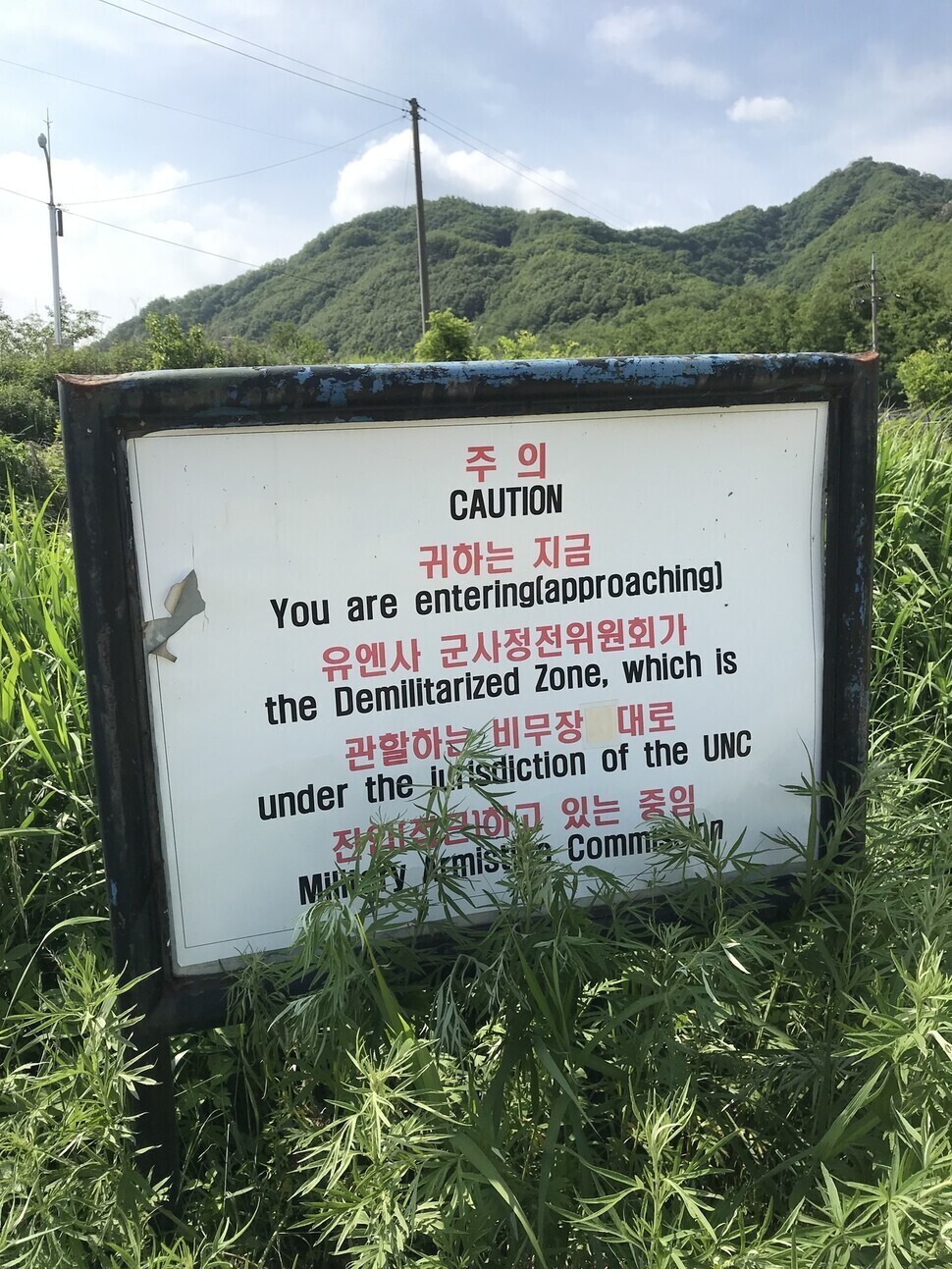hankyoreh
Links to other country sites 다른 나라 사이트 링크
[Editorial] The UNC’s control over the DMZ needs to be reevaluated

In response to a debate over whether UN Command (UNC) permission is needed to pass through or enter the DMZ, the Ministry of National Defense (MND) has shared its first official authoritative interpretation, which states that UNC determinations “are only necessary for entrance and exit activities of a military nature.”
The MND submitted this response on Sept. 30 as part of material replying to questions on the Korean War Armistice Agreement by Democratic Party lawmaker Jeon Hae-cheol. Having presented its official interpretation, the MND must now engage in official discussions with the UNC to avoid a repeat of sovereignty infringement accusations concerning entrance and exit activities in the DMZ. The UNC has faced criticisms for hampering inter-Korean exchange and cooperation efforts by disallowing access to the DMZ for non-military purposes such as inter-Korean railway surveys, without offering any clear grounds for doing so.
During peacetime, the UNC’s chief duties concern maintenance and management of the Korean Armistice Agreement. It wields the authority to permit passage and entry at the Military Demarcation Line (MDL) and DMZ. Anyone seeking to enter the DMZ or pass through the MDL for any purpose must be granted UNC approval. The UNC has been accused of exploiting this authority to interfere in inter-Korean relations. After inter-Korean exchange and cooperation activity began picking up in the wake of the inter-Korean summits since 2000, the UNC has routinely rejected applications to enter the DMZ for non-military purposes, without any clear standards for doing this.
In August 2018, an application by the South Korean government to pass through the MDL for a survey of the North’s Gyeongui Line railway was rejected. A modernization of the Gyeongui and Donghae Lines that was one of the main projects agreed upon at the inter-Korean summit of Apr. 27, 2018, encountered difficulties from the outset. Ahead of an inter-Korean survey team’s passage of the MDL in 2002 for a mutual check on the removal of mines in stretches where inter-Korean roads and railways were to be connected, the UNC insisted that the South Korean military had to go through UNC approval procedures.
Typically, the UNC cites “safety” issues as a reason for refusing approval. But this is unconvincing, given that the South Korean government has only requested approval for places where security has been ensured. This is why the UNC has been accused of overstepping its authority and prioritizing US interests.
Hopefully, the South Korean government can discuss matters with the UNC to improve the procedures for approval to enter the DMZ, which has raised issues extending to the infringement of sovereignty. The preamble to the Armistice Agreement states that the authority of the UNC is “intended to be purely military in character.”
This suggests that the UNC’s practice of granting approval for entry of the DMZ for non-military purposes is not suited to the terms of the Korean Armistice Agreement. We may be able to find a realistic alternative, such as adopting a “reporting” system rather than “approval” system. We look forward to finding a way to improve this system in a way that suits South Korea’s national stature.
Please direct comments or questions to [english@hani.co.kr]

Editorial・opinion
![[Editorial] Does Yoon think the Korean public is wrong? [Editorial] Does Yoon think the Korean public is wrong?](https://flexible.img.hani.co.kr/flexible/normal/500/300/imgdb/original/2024/0417/8517133419684774.jpg) [Editorial] Does Yoon think the Korean public is wrong?
[Editorial] Does Yoon think the Korean public is wrong?![[Editorial] As it bolsters its alliance with US, Japan must be accountable for past [Editorial] As it bolsters its alliance with US, Japan must be accountable for past](https://flexible.img.hani.co.kr/flexible/normal/500/300/imgdb/original/2024/0417/6817133413968321.jpg) [Editorial] As it bolsters its alliance with US, Japan must be accountable for past
[Editorial] As it bolsters its alliance with US, Japan must be accountable for past- [Guest essay] Amending the Constitution is Yoon’s key to leaving office in public’s good graces
- [Editorial] 10 years on, lessons of Sewol tragedy must never be forgotten
- [Column] A death blow to Korea’s prosecutor politics
- [Correspondent’s column] The US and the end of Japanese pacifism
- [Guest essay] How Korea turned its trainee doctors into monsters
- [Guest essay] As someone who helped forge Seoul-Moscow ties, their status today troubles me
- [Editorial] Koreans sent a loud and clear message to Yoon
- [Column] In Korea’s midterm elections, it’s time for accountability
Most viewed articles
- 1[Column] The clock is ticking for Korea’s first lady
- 2Samsung barricades office as unionized workers strike for better conditions
- 3[Editorial] When the choice is kids or career, Korea will never overcome birth rate woes
- 4[News analysis] After elections, prosecutorial reform will likely make legislative agenda
- 5S. Korea, Japan reaffirm commitment to strengthening trilateral ties with US
- 6Japan officially says compensation of Korean forced laborers isn’t its responsibility
- 7Why Israel isn’t hitting Iran with immediate retaliation
- 8[Editorial] Does Yoon think the Korean public is wrong?
- 9[Guest essay] How Korea turned its trainee doctors into monsters
- 10[Guest essay] Amending the Constitution is Yoon’s key to leaving office in public’s good graces